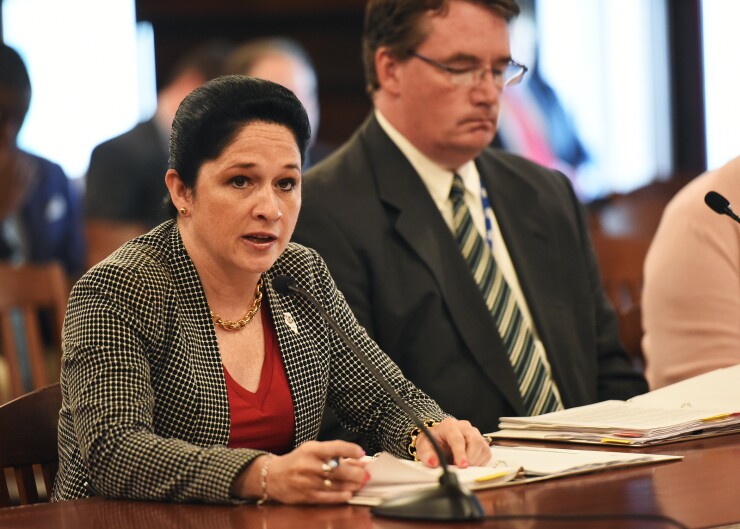CHICAGO – Debt service on Illinois bonds “will not be delayed or diminished” even as a $15 billion bill backlog and court actions are threatening the state’s ability to meet priority obligations, state Comptroller Susana Mendoza said Tuesday.
“As a message to the financial markets, please know that debt service payments will not be delayed or diminished going forward and I will use every statutory avenue or available resource to meet that commitment,” Mendoza wrote in a letter to Gov. Bruce Rauner that was also distributed to state lawmakers.

“It is a necessary pledge in order to attempt to avoid further damage to our already stressed credit ratings and to make possible the additional debt financing that we all know will be required to achieve some measure of stability going forward,” Mendoza said in a reference to widely supported short-term borrowing proposals to pay down the backlog if a budget agreement is reached.
The state’s general obligation statutes allow for the state to tap any available revenues including various non-general fund accounts that hold more than $10 billion -- without legislative action.
Mendoza’s letter, which comes as a special session is set to begin Wednesday, outlines the growing liquidity crisis. The state has been operating on piecemeal appropriations since July 2015. About 90% of spending flows from continuing appropriations and legal actions, at levels were based on the state's revenue before the partial expiration of an income tax hike in January 2015.
The state’s “dire fiscal straits” could soon impair payments on critical core responsibilities because a new “phase of crisis” is approaching with the bill backlog growing and the office required to accommodate state and federal court decisions on spending, Mendoza said.
“My office has very serious concerns that, in the coming weeks, the state of Illinois will no longer be able to guarantee timely and predictable payments in a number of areas….we are effectively hemorrhaging money as the state’s spending obligations have exceeded receipts by an average of over $600 million per month over the past year,” she wrote.
The strains are growing all the more unmanageable, even before a resolution, still being negotiated, on how the state will speed up the payment on the $2.8 billion backlog of Medicaid claims. Negotiations among lawyers for Mendoza, Illinois Attorney General Lisa Madigan, and Medicaid recipients are continuing over speeding up state payments to comply with federal consent decrees.
Judge Joan Lefkow of the U.S. District Court for the Northern District of Illinois’ Eastern Division earlier this month found the state in violation of decrees but she gave the state some breathing room by allowing time to reach a negotiated agreement.
“The parties are directed to continue to negotiate to achieve substantial compliance with the consent decrees in these cases,” her June 7 order said. “If they cannot reach a negotiated solution, either party may make an appropriate motion, to be noticed for presentment on June 20, 2017, at 10:00 a.m.”
Neither has filed such a motion and all sides remain at the table. Some media outlets had reported June 20 as a “deadline” for an agreement leading to confusion among some market participants. The next status hearing on the case is set for June 28.
While the decision stopped short of ordering the state to immediately prioritize the payments over “core” obligations like debt service and pension contributions, it poses another strain that could crowd out other priorities like school aid payments and pension contributions.
Worries about the judge’s action prompted a
“This office will soon be facing the prospect of deciding which court order or statutory mandate the state can accommodate,” Mendoza wrote. “The state can no longer function without a responsible and complete budget without severely impacting our core obligations and decimating services to the state’s most in need citizens. We must put our fiscal house in order.”
Moody’s Investors Service and S&P Global Ratings downgraded the state to the lowest investment grade level of Baa3/BBB-minus earlier this month. S&P made clear a drop to junk likely looms absent a budget agreement by the start of the fiscal year July 1.
Fitch Ratings has said it views the beginning of the new fiscal year as a key marker for a downgrade of the state’s BBB rating.





